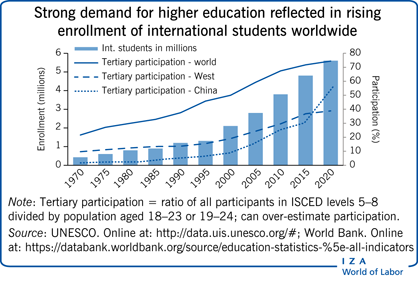Elevator pitch
In knowledge-based economies, attracting and retaining international students can help expand the skilled workforce. Empirical evidence suggests that open migration policies and labor markets, whereby students can remain in the host country post-study, as well as good quality higher education institutions are crucial for successfully attracting international students. Student migration can positively affect economic growth in both sending and receiving countries, even though migrants themselves reap most of the gains, mainly through higher earnings.

Key findings
Pros
International student migration results in higher wages for the migrants, without negative effects on most native workers.
International student migration can foster economic growth in both home and host countries.
Native students are not crowded-out by international students, nor does their presence reduce learning in the classroom.
Open visa policies can improve both the number and the quality of incoming international students.
Cons
Some sending countries are at risk of brain drain, and their economic growth can falter as a result of excessive student emigration.
Overdependence on international students might affect the financial stability of higher education institutions in host countries.
Institutional differences between labor markets might impose wage penalties on international graduates who return home.